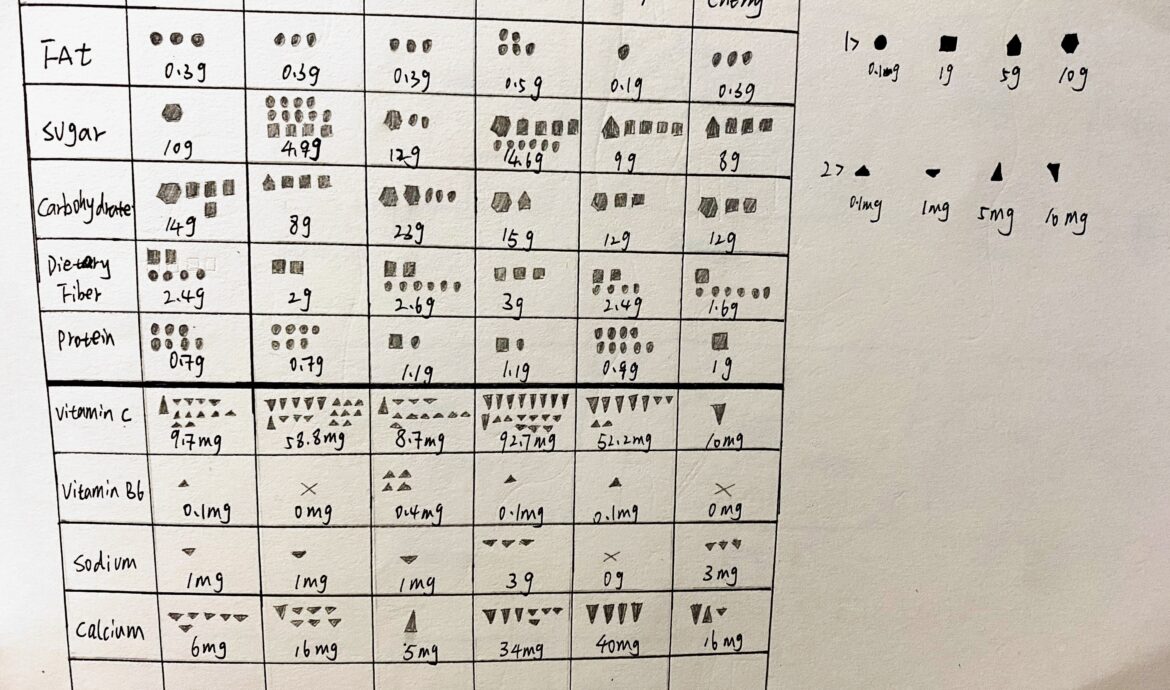
Project 1 data- research
projectBrief:
I chose these 6 fruits: Blueberry, Strawberry, banana, kiwi, orange, and cherry. Because according to scientific research, these 6 kinds of fruits are very helpful to human beings.
There are many fruits that are low in calories and high in nutrition. As part of a healthy and diverse diet, fruits can bring many benefits to humans and help reduce a person's risk of multiple diseases.
The nutrients in fruits offer a range of health benefits. This data work produces data on the nutrition of fruits. Let people understand the power of fruit.
Research:
Eating more fruit is an excellent way to improve overall health and reduce the risk of disease. Fruits are an excellent source of essential vitamins and minerals, and they are high in fiber. Fruits also provide a wide range of health-boosting antioxidants, including flavonoids.
Eating a diet high in fruits and vegetables can reduce a person’s risk of developing heart disease, cancer, inflammation, and diabetes. Citrus fruits and berries may be especially powerful for preventing disease.
A 2014 studyTrusted Source ranked “powerhouse” fruit and vegetables by high nutrient density and low calories. Lemons came out top of the list, followed by strawberry, orange, lime, and pink and red grapefruit.
In 2015, a study linked grapefruit and orange juice with a higher risk of skin cancer. Researchers found that people who consumed high amounts of whole grapefruit or orange juice were over a third more likely to develop melanoma than those who consumed low amounts. This may have been due to citrus compounds that exert photocarcinogen properties.
Reference:
1. Top 12 healthful fruits,https://www.medicalnewstoday.com/articles/324431
2. Vitamin C: Why is it important?https://www.medicalnewstoday.com/articles/219352
By looking up some information, I made the main elements of the fruit into a table for later design and use.
| Per 100g Value | Blueberry | Strawberry | Banana | Kiwifruit | Orange | Cherry |
| Fat | 0.3 g | 0.3 g | 0.3 g | 0.5 g | 0.1 g | 0.3 g |
| Sugars | 10 g | 4.9 g | 12 g | 14.6 g | 9 g | 8 g |
| Carbohydrates | 14 g | 8 g | 23 g | 15 g | 12 g | 12 g |
| Dietary fiber | 2.4 g | 2 g | 2.6 g | 3 g | 2.4 g | 1.6 g |
| Protein | 0.7 g | 0.7 g | 1.1 g | 1.1 g | 0.9 g | 1 g |
| Vitamin C | 9.7 mg | 58.8 mg | 8.7 mg | 92.7 mg | 52.2 mg | 10 mg |
| Vitamin B6 | 0.1 mg | 0 mg | 0.4 mg | 0.1 mg | 0.1 mg | 0 mg |
| Sodium | 1 mg | 1 mg | 1 mg | 3 mg | 0 mg | 3 mg |
| Calcium | 6 mg | 16 mg | 5 mg | 34 mg | 40 mg | 16 mg |
| Reference | https://en.wikipedia.org/wiki/Blueberry | https://en.wikipedia.org/wiki/Strawberry | https://en.wikipedia.org/wiki/Banana | https://en.wikipedia.org/wiki/Kiwifruit | https://www.verywellfit.com/oranges-nutrition-facts-calories-and-health-benefits-4119322 | https://en.wikipedia.org/wiki/Cherry |
